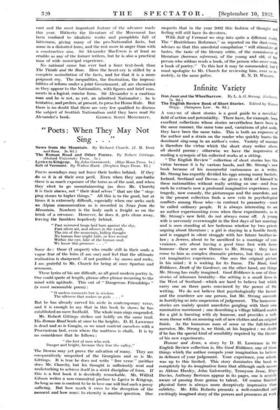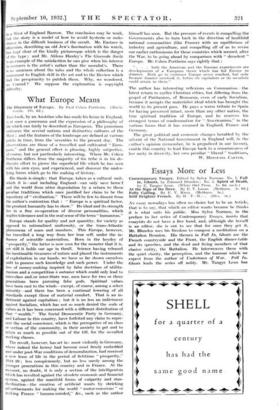Infinite Variety
Don Juan and the Wheelbarrow. By L. A. G. Strong. (Gollanez. 7s. 6d.) The English Review Book of Short Stories. Edited by Home Shipp. (Sampson Low. Ss. 6d.) A VOLUME of short stories is a good guide to a novelists' field of action and potentiality. There have, for example, been excellent collections whose stories nevertheless have been in the same manner, the same tone and, variations of plot aside, they have been the same tales. This is both an exposure of the author and a strain on the reader who quickly learns the
dominant sing-song in an author's voice. Variety of manner is therefore the virtue which the short story writer above all should pursue ; otherwise • we • have - the impression of reading a synopsis of his collected works at a sitting.
"The English Review" collection of short stories has this virtue because it is by various hands, and Mr. Strong's new book because of his resourceful variousness as a writer. Mr. Strong has expertly divided his eggs among many baskets.
Ireland, Scotland • and Devon—he gives a little of himself to these nationalities without really settling on one—and from each he extracts now a profound imaginative experience, now tragedy, now comedy, the picturesque and the anecdote, and in the present collection finds a new vein in psychological conflicts among those who—in contrast to peasantry—must be called ordinary people. It is always interesting to see an author experimenting even when these experiments, as in Mr. Strong's new field, do not always come off. A young wife is nervously overwrought in the first days of her marriage and is seen standing at her bedroom window by two priests arguing about literature ; a girl is staying in a hostile family and is engaged in silent struggle with her future brother-in-
law ; a Jewess, about to be sacrificed to a marriage of con- venience, sets about having a good time first with fierce
humour—these are new themes to Mr. Strong : they have come to him as complex dramatic pictures, but they are not yet imaginative experiences. One sees the original picture in his mind ; it is waiting for its frame. The Rook, Good Riddance, Death of the Gardener, on the other hand, are things Mr. Strong has really imagined. Good Riddance is one of those stories of inhuman brutality—the setting is a small farm in the West of Scotland—which are hard to believe but which carry one on three parts convinced by the power of the writing. We do not believe that psychologically the farmer and the murderer are one person, but Mr. Strong succeeds in horrifying us into suspension of judgement. The humorous stories are mainly quaint anecdotes gurgling with their own ruminative merriment ; one describing a village billiard match for a girl is bursting with sly humour, and provides a welt worn theme with an amusing suit of new clothes and an original finish. As the humorous man of sense or the full-blooded narrator, Mr. Strong is, we think, at his happiest : we doubt if he has the special kind of sensibility required by the themes of his new experiments.
Honour and Arms, a story by D. H. Lawrence in the English Review collection is, like Good Riddance, one of those things which the author compels your imagination to believe in defiance of your judgement. Your experience, you admit, was up. to this limited. This story dominates the book so completely by its imaginative force that although such names as Aidous Huxley, John Galsworthy, Tennyson Jesse, Rhys Davies, Anthony Bertram appear in its pages, one is acutely aware of passing from genius to talent. Of course finished physical force is always more deceptively impressive than subtlety. Mr. Ellis Roberts presents a well-controlled and excitingly imagined story of the powers and presences at work
in a West of England Barrow. The conclusion may be weak, but the story is a model of how to avoid hysteria or melo- drama in the difficult business of the occult. Mr. Eustace in obsession, describing an old Jew's fascination with his watch, has kept clear of the kindly picturesque which is the danger (4 the type ; and Mr. Aldous Huxley's The Gioconda Smile is an example of the satisfaction he can give when his interest in manners is the artist's rather than the' moralist's. There is no sameness about the tales and the whole collection is a monument to English skill in the art and to the Review which had the perspicacity to publish them. Why, we wondered, no Conrad ? We suppose the explanation is copyright difficulty.































 Previous page
Previous page